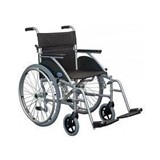These exercises could include balancing on one leg to brush your teeth, bending your knees to pack the dishwasher or taking the stairs more often.
They are all part of the Lifestyle-Integrated Functional Exercise (LiFE) program, being launched by the University of Sydney.
Informed by a world-first study, this innovative and non-traditional approach to exercise has been proven to reduce falls by over 30 per cent by incorporating strength and balance training into everyday activities and daily routines.
Lead researcher Professor Lindy Clemson from the Faculty of Health Sciences said that bad balance, and weak ankles and hips are the most common causes of falls in older people, but many people are reluctant to do any structured strength or balance training.
Balance exercises on a daily basis
"It's well known that improving balance and strength can prevent falls in older adults, but less than 10 per cent of us regularly engage in any kind of strength training and balance is even less understood," Professor Clemson said.
"What makes our program different is that we encourage people to get creative and do balance and lower limb strength activities whenever the opportunity arises throughout their day, such as sideways walking when hanging out the washing."
In a world where everything is now done with a push of the button, Professor Clemson believes the LiFE program offers some much-needed challenge and complexity.
"This program will ultimately increase people's independence by allowing them to stay mobile and living in their homes for longer," Professor Clemson said.
The LiFE manuals are the result of research by Professor Clemson and colleagues published in the British Medical Journal.
They recruited 317 men and women over the age of 70, living at home, who suffered two or more falls in the past year. They compared those participating in the LiFE program to a control group doing a gentle 'placebo' exercise program three times a week, and a third group who did traditional balance and strength exercises three times a week.
LiFE program compared to control group
The researchers found a 31 per cent reduction in the rate of falls for participants in the LiFE program compared with the control group.
LiFE participants also showed improvements in static and dynamic balance, ankle strength, and in function and participation in daily life, suggesting that the program improves both fall risk and frailty.
"The lifestyle intervention was also found to be more successful than the structured exercise program in reducing falls and there was better adherence," Professor Clemson said.
"One woman in the study told us she now views her kitchen as her gym."
Both participant and trainer LiFE manuals are available from Sydney University Press. People can seek support in how to do the program from a qualified occupational therapist or physiotherapist.
















